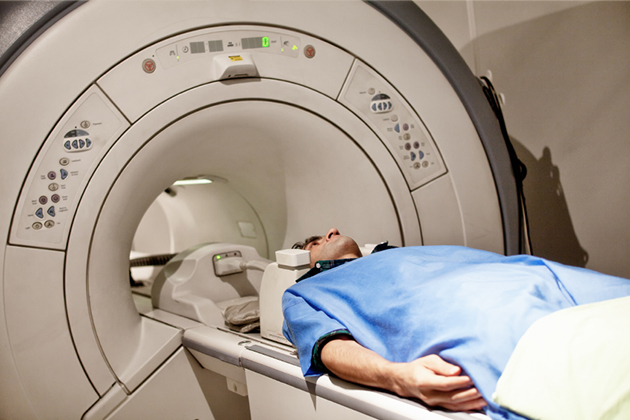
The University of Connecticut is in the process of purchasing and installing an fMRI machine for research at its flagship campus, adding a major asset to the University’s expertise in cognitive science, speech and language, and numerous other fields.
Scientists at UConn and other research institutions worldwide use the non-invasive, radiation-free technology of fMRI (Functional Magnetic Resonance Imaging) to assess how the brain’s blood flow and oxygen change in particular areas in response to certain stimuli. It can help illustrate how language and speech are acquired, how pain and emotions are processed, and a myriad other brain functions.
While UConn’s research in brain science is already robust, officials say having the fMRI equipment based at Storrs will be a powerful additional asset for faculty as they build on their expertise in a wide variety of areas.
The fMRI, for which the Board of Trustees approved the budget in the fall, could be in place in the Phillips Communication Sciences Building and ready for researchers’ use by early 2015 if all remains on schedule.
The UConn Health Center has an MRI machine, but it is used for clinical work on patients and is not set up for functional brain studies in which participants respond to visual displays or speech while in the scanner. Researchers at UConn’s Storrs campus and regional locations generally must use some of their projects’ grant budgets to rent time on fMRI equipment at Yale, Brown, the Institute of Living in Hartford, and other institutions.

UConn researchers from several disciplines use fMRI technology and cognitive neuroscience in their work, including in psychology, linguistics, philosophy, communication disorders, and other fields.
Having an fMRI machine at Storrs will enable them to direct more of their grant funding directly to their projects, and boost the University’s ability to recruit other talented faculty members and graduate students.
It’s also expected to help faculty members develop valuable collaborations in a variety of fields, and could bring in external funding if appointments to use the fMRI can be rented out when it’s not in use by UConn researchers.
“Brain science has been developing at a rapid pace internationally, including much success here at UConn,” President Susan Herbst says, noting that President Obama has focused the nation even more intently on the topic through BRAIN (Brain Research through Advancing Innovative Neurotechnologies), a major federal research funding initiative.
“Our scientists do terrific work, but must often travel to other institutions to use fMRI technology, equipment that is absolutely essential to their fields,” Herbst says. “We need our own research-dedicated magnet in Storrs if we are to retain and recruit top scientists.
UConn’s Board of Trustees approved an $8 million budget this fall for the purchase and installation of the fMRI equipment. That includes money to renovate a portion of the Phillips building into an fMRI suite, which must be specially designed to prevent any outside vibrations, noise, or other interference from affecting the results.
About a dozen UConn researchers currently use fMRI as part of their research, and several others have expressed interest in using the technology. Their fields include psychology, linguistics, kinesiology, economics, molecular and cell biology, education, physiology and neurobiology, computer science and engineering, and speech, language, and hearing sciences.

Their work ranges from the study of autism to the way speech and language is processed, how the brain works after a traumatic injury, and whether cognitive neuroscience influences some students’ academic difficulties.
“The brain is a very complicated organ, and in my view we are just beginning to scratch the surface in terms of what can be learned about it,” says Jim Green, professor and chair of the psychology department, who worked with other faculty and staff to develop a plan to situate UConn’s own fMRI in Storrs as quickly as possible.
The continuing evolution of the technology also creates research opportunities for physicists, engineers, computer scientists, and statisticians – which will be valuable as the University embarks on the Next Generation Connecticut project to bolster its research and curriculum in science, technology, engineering, and math (STEM).
The University has been recruiting heavily in cognitive science fields, and has drawn talented researchers to Storrs from such institutions as Yale, the University of Virginia, York University in England, Northwestern University, the University of North Carolina-Chapel Hill, and the Basque Center on Cognition, Brain, and Language in Spain.
Jay Rueckl, an associate professor and head of the Perception, Action, and Cognition division of the psychology department, says having fMRI equipment at Storrs will also help faculty members and graduate students collect pilot data as they seek grants for their projects.
And while it’ll be a boon to recruiting new researchers, he says, there also already are a large number of current faculty members who are eager to learn more about using it themselves.
“The intention is to grow the user base, both with future hires and by training people and giving them the opportunities for more team research,” Rueckl says.
The fMRI machine can also be used by UConn researchers in fields not directly related to brain sciences, since joints and other parts of the musculoskeletal system can also be examined using the non-invasive technology.
Diane Lillo-Martin, director of UConn’s Cognitive Science Program and Board of Trustees Distinguished Professor of Linguistics, says having the fMRI at the Storrs campus will support and advance the University’s work in a variety of fields.
“There are already cross-disciplinary connections being made between the cognitive science program and people in education, in engineering, in physics, and elsewhere,” she notes. “This will continue to broaden the scope of interactions that are possible on campus and the work they produce.”


